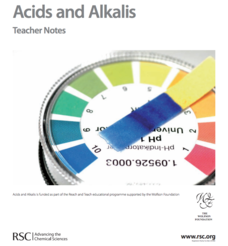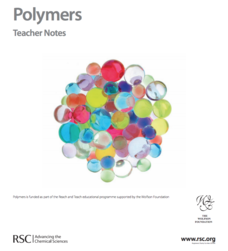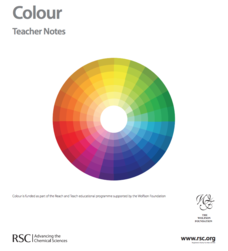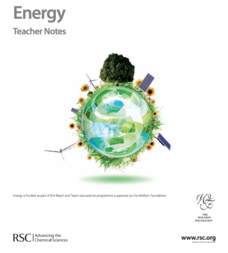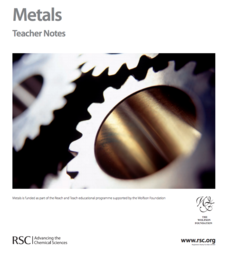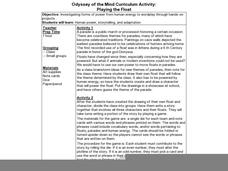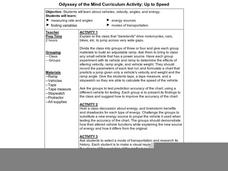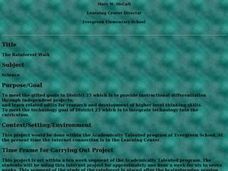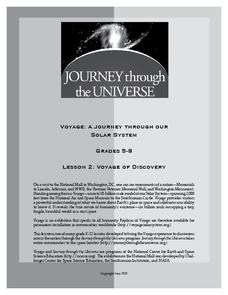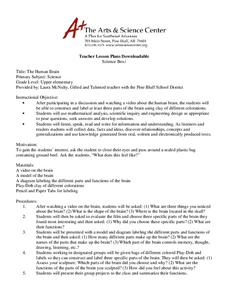Royal Society of Chemistry
Equilibria—Gifted and Talented Chemistry
Teaching is a balancing act! Keep things on an even keel with a comprehensive equilibrium lesson plan. The resource covers reversible and irreversible reactions, Le Chatelier's Principle, and the industrial applications of equilibrium...
Royal Society of Chemistry
Acids and Alkalis—Gifted and Talented Chemistry
Looking for a comprehensive plan for teaching acid-base chemistry? Science scholars discover acid-base interactions through a thoughtfully written unit. The resource is divided into paced activities and individual work designed to...
Royal Society of Chemistry
Polymers—Gifted and Talented Chemistry
Polymers are an important part of our day-to-day lives, but how much do your pupils know about them? Learn the basics and beyond in a series of activities designed to build skills in observation, planning, organic chemistry, and bonding.
Royal Society of Chemistry
Colour—Gifted and Talented Chemistry
Add a splash of color to your chemistry class! Science scholars discover the principles behind color through a wide variety of hands-on activities. Lessons include dyes, chromatography, and flame tests.
Royal Society of Chemistry
Energy—Gifted and Talented Chemistry
What has more energy than a room full of pupils after a fire drill? This lesson plan! Explore the changes in energy during different chemical reactions, discover why some reactions feel cold and others feel hot, and tackle the concept of...
Royal Society of Chemistry
Metals—Gifted and Talented Chemistry
Malleable, magnetic, mesmerizing metals! Pupils love learning about metallic elements, especially through the hands-on activities in an engaging lesson plan. The resource provides thorough instruction on the properties of metals, the...
Odyssey of the Mind
Odyssey of the Mind Curriculum Activity: Playing the Float
Got a rainy day and need a few fabulous activities to foster creative thinking skills? The class works to understand the three types of human power; direct, indirect, and stored. They do this by first creating a parade float like the...
Odyssey of the Mind
Odyssey of the Mind Curriculum Activity: Up to Speed
Here are three great group project ideas to reinforce the concepts of velocity, transportation, and energy. In small groups, learners construct adjustable ramps, predict, and then test to determine the affects of altering velocity, ramp...
Odyssey of the Mind
Odyssey of the Mind Curriculum Activity: From a Distance
Challenge your class with an amazing set of ideas that really put the project back into project-based learning. It all starts with a whole class research task. Each learner will look up and take notes on multiple facets of things that...
Intel
Lights, Camera, Reaction!
Excite classes with a STEM project-based learning lesson covering chemical reactions. Groups study the different types through simulations and hands-on activities. They pick one type (synthesis, decomposition, single displacement, double...
Curated OER
"N.A.S.A." Tower Structures Lesson Plan
Students, who are talented and gifted, create tower structure according to the given specifications that is able to support a tennis ball for 75 seconds but costs the least to build. They each design a tower in their journal but work in...
Curated OER
The Rainforest Walk
Fourth graders research the characteristics and inhabitants of the rainforest. They demonstrate their ability to communicate using e-mail and create a class presentation of their research.
Journey Through the Universe
Voyage of Discovery
Did you know that Pluto is smaller than the United States of America? It is difficult to conceptualize the size of planets and the distance between them, and the lesson addresses those exact issues. After a discussion, pupils create...
Curated OER
Using Optical Illusion Brain Teasers Add a Twist to Math and Science
Optical illusion activities can provide a motivating way for students to explore math and science concepts.
Curated OER
Science Center Ideas for Students Who Finish Work Early
A science center can be a great way to extend the learning of students who finish their work early.
New York City Department of Education
Project Based Learning
After reviewing the information included in this resource, you will be an expert in both the definition of project-based learning and how to implement it with your class. Discover and explore thorough explanations, detailed...
Curated OER
Where Did the Science Experiments Go?
Hands-on science experiments are essential for student learning.
Curated OER
Mantle Motions
Learners define vocabulary words associated with lithospheric plate motions. They create and write down a motion to act out each vocabulary word, and participate in a game of demonstrating the actions associated with each word.
Curated OER
Biospheres
Second graders create models, practice inquiry skills, work with fellow students in teams, and reinforce concepts discussed in class all by using the theme of BIOSPHERES.
Curated OER
Chesapeake Bay Watershed Project
Students conduct a simulation to determine the health of local streams and rivers. They role-play as researchers, scientists, politicians, and writers and use technology to implement plans to improve the quality of waterbodies.
Curated OER
The Human Brain
Students identify parts of the human brain. In this biology lesson, students watch a video about the human brain. Students use different colors of clay to construct and label the three parts of the brain.
Curated OER
Global Warming and Hurricanes: Is an Increase in the Number of Stronger Hurricanes an Indicator of Global Warming
Ninth graders investigate whether stronger hurricanes are signs of global warming. In this environmental science lesson, 9th graders research both sides of the issue about global warming. They debate for or against this issue in class.
Curated OER
Electricity and Energy
Students demonstrate that electricity can flow in a circuit. They demonstrate safe practices during lab investigations.
Curated OER
The Strength of the Muscular System
Seventh graders investigate the strength of the muscular system. They explore voluntary and involuntary muscle movement and discuss the types of muscles: cardiac or heart, skeletal, and smooth. They visit stations to answer questions...
Other popular searches
- Gifted and Talented Math
- Gifted and Talented Education
- Gifted and Talented Lessons
- Gifted and Talented Reading
- Gifted and Talented Science
- Gifted and Talented Art
- Gifted and Talented Writing
- Gifted and Talented Students
- Gifted and Talented Music
- Talented and Gifted
- Gifted and Talented Projects
- Gifted and Talented Esl

